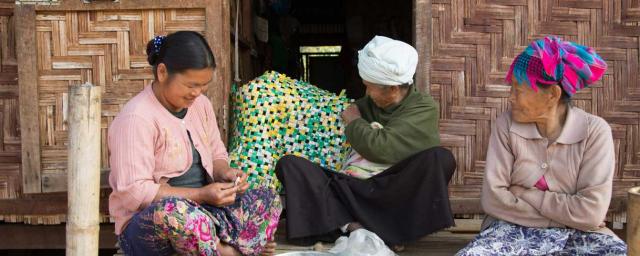
Oxfam’s vision for Myanmar is for all citizens, including women and ethnic nationalities, to be able to enjoy their social, cultural, economic, civil and political rights.
Myanmar is the second biggest country in South East Asia, bordering five countries and with a population of over 50 million. Although it is rich in resources, the country is affected by multiple conflicts and over twenty percent of the population still live below the poverty line. Most people work in agriculture but industrialization is rapid and there is a growing manufacturing industry – which both offers opportunities and poses threats.
Despite the speedy economic change, Myanmar still faces natural disasters and multiple, protracted conflicts, including a major refugee crisis which in 2017 saw an outpouring of over 650,000 Rohingya refugees from Rakhine State over the border into Bangladesh. Inside Myanmar, over 240,000 people remain internally displaced in Rakhine, Kachin, Shan and the South-East as a result of the conflict. There are also 100,000 Myanmar refugees on the Thai-Myanmar border who fled from conflict in the South-East of the country.
Oxfam in Myanmar
Reducing poverty and inequality
In Myanmar, Oxfam works to reduce poverty and inequality through promoting the power of women and men to harness the benefits of political reform and economic development. This involves working with people to develop their ability to influence companies and to hold decision-makers to account so that policies protect their rights and reduce inequality and poverty for all.
We are also working with both government to strengthen its capacity to be more accountable and responsive to peoples’ needs, and with the private sector to be more accountable and transparent to communities and meet their human rights obligations.
Humanitarian response
In Kachin and Rakhine, where hundreds of thousands of people have been displaced by conflict, Oxfam works with local and national Myanmar organizations as well as directly with populations, to meet the humanitarian needs of affected people.
As Myanmar is at severe threat from natural disasters and suffers from protracted humanitarian emergencies, Oxfam is also working with community leaders, in particular women, to build their resilience and prepare for the impact of disasters.
Hla Htoi is a member of a corn plantation group established by Oxfam partner, Kachin Baptist Convention (KBC), as part of the programme's work to support internally-displaced persons. The group has had significant success in growing corn, but faces many challenges related to the conflict and fluctuating markets. Photo: Dustin Barter/Oxfam
In Rakhine, where approximately 129,000 people remain internally displaced due to violence since 2012, Oxfam partners with Solidarités International in delivering water, sanitation and hygiene assistance in 22 IDP sites in Sittwe, reaching approximately 98,000 displaced people with funding support from DFID through the HARP Facility. Oxfam works in two IDP sites in Kyauk Phyu, providing support with funding from UNICEF. Oxfam also carries out resilience and risk reduction activities with communities living in Kyauk Taw.
In Kachin, Oxfam is reaching over 80,000 people from displaced and host communities through our humanitarian, peace, and development nexus programming. Oxfam works closely with nine national organizations forming the Joint Strategy Team, who are pioneering local leadership in humanitarian assistance in over 120 IDPs sites with integrated humanitarian-peace-development assistance, reaching over 80,000 people from displaced and host communities with funding support from EU and ECHO.
